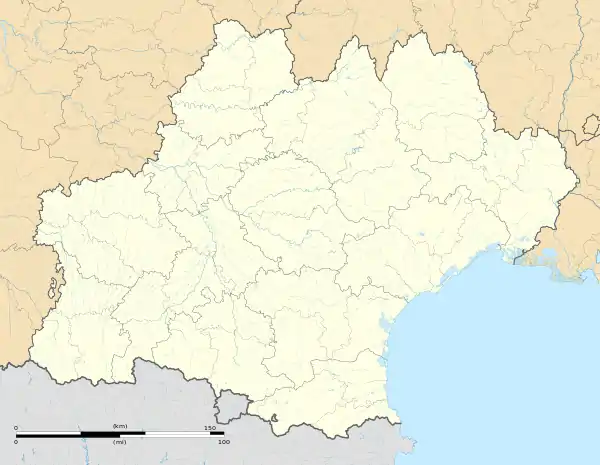Val-d'Aigoual | |
|---|---|
 A general view of Valleraugue | |
Location of Val-d'Aigoual | |
 Val-d'Aigoual  Val-d'Aigoual | |
| Coordinates: 44°04′54″N 3°38′33″E / 44.0817°N 3.6425°E | |
| Country | France |
| Region | Occitania |
| Department | Gard |
| Arrondissement | Le Vigan |
| Canton | Le Vigan |
| Intercommunality | Causses Aigoual Cévennes |
| Government | |
| • Mayor (2020–2026) | Joël Gauthier[1] |
| Area 1 | 78.35 km2 (30.25 sq mi) |
| Population | 1,418 |
| • Density | 18/km2 (47/sq mi) |
| Time zone | UTC+01:00 (CET) |
| • Summer (DST) | UTC+02:00 (CEST) |
| INSEE/Postal code | 30339 /30570 |
| Elevation | 294–1,567 m (965–5,141 ft) (avg. 367 m or 1,204 ft) |
| 1 French Land Register data, which excludes lakes, ponds, glaciers > 1 km2 (0.386 sq mi or 247 acres) and river estuaries. | |
Val-d'Aigoual (French pronunciation: [val dɛɡwal]) is a commune in the Gard department in southern France. It was established on 1 January 2019 by merger of the former communes of Valleraugue (the seat) and Notre-Dame-de-la-Rouvière.[3]
Geography
Climate
Val-d'Aigoual has a warm-summer Mediterranean climate (Köppen climate classification Csb) closely bordering on a hot-summer Mediterranean climate (Csa). The average annual temperature in Val-d'Aigoual is 12.7 °C (54.9 °F). The average annual rainfall is 1,661.7 mm (65.42 in) with October as the wettest month. The temperatures are highest on average in July, at around 21.8 °C (71.2 °F), and lowest in January, at around 4.8 °C (40.6 °F). The highest temperature ever recorded in Val-d'Aigoual was 41.1 °C (106.0 °F) on 12 August 2003; the coldest temperature ever recorded was −12.0 °C (10.4 °F) on 14 February 1999.
| Climate data for Val-d'Aigoual (Valleraugue, altitude 360m, 1981–2010 normals, extremes 1993–2010) | |||||||||||||
|---|---|---|---|---|---|---|---|---|---|---|---|---|---|
| Month | Jan | Feb | Mar | Apr | May | Jun | Jul | Aug | Sep | Oct | Nov | Dec | Year |
| Record high °C (°F) | 19.9 (67.8) |
21.3 (70.3) |
27.5 (81.5) |
31.1 (88.0) |
33.1 (91.6) |
39.5 (103.1) |
37.8 (100.0) |
41.1 (106.0) |
36.5 (97.7) |
28.6 (83.5) |
23.5 (74.3) |
20.3 (68.5) |
41.1 (106.0) |
| Mean daily maximum °C (°F) | 9.0 (48.2) |
10.8 (51.4) |
15.2 (59.4) |
17.6 (63.7) |
21.8 (71.2) |
27.1 (80.8) |
29.8 (85.6) |
29.1 (84.4) |
23.7 (74.7) |
18.2 (64.8) |
12.7 (54.9) |
9.0 (48.2) |
18.7 (65.7) |
| Daily mean °C (°F) | 4.8 (40.6) |
5.7 (42.3) |
9.1 (48.4) |
11.6 (52.9) |
15.2 (59.4) |
19.4 (66.9) |
21.8 (71.2) |
21.4 (70.5) |
17.0 (62.6) |
13.2 (55.8) |
8.3 (46.9) |
5.0 (41.0) |
12.7 (54.9) |
| Mean daily minimum °C (°F) | 0.7 (33.3) |
0.6 (33.1) |
3.0 (37.4) |
5.6 (42.1) |
8.6 (47.5) |
11.7 (53.1) |
13.9 (57.0) |
13.8 (56.8) |
10.2 (50.4) |
8.2 (46.8) |
3.9 (39.0) |
1.0 (33.8) |
6.8 (44.2) |
| Record low °C (°F) | −10.1 (13.8) |
−12.0 (10.4) |
−11.6 (11.1) |
−2.5 (27.5) |
−0.7 (30.7) |
3.4 (38.1) |
5.2 (41.4) |
5.1 (41.2) |
1.7 (35.1) |
−4.6 (23.7) |
−7.9 (17.8) |
−10.6 (12.9) |
−12.0 (10.4) |
| Average precipitation mm (inches) | 170.3 (6.70) |
113.7 (4.48) |
77.7 (3.06) |
136.9 (5.39) |
115.5 (4.55) |
56.7 (2.23) |
39.2 (1.54) |
55.8 (2.20) |
166.6 (6.56) |
267.2 (10.52) |
252.0 (9.92) |
210.1 (8.27) |
1,661.7 (65.42) |
| Average precipitation days (≥ 1.0 mm) | 10.9 | 8.7 | 6.7 | 8.8 | 8.4 | 5.1 | 4.6 | 5.9 | 6.3 | 10.7 | 10.5 | 10.1 | 96.6 |
| Source: Météo-France[4] | |||||||||||||
See also
References
- ↑ "Répertoire national des élus: les maires" (in French). data.gouv.fr, Plateforme ouverte des données publiques françaises. 13 September 2022.
- ↑ "Populations légales 2021". The National Institute of Statistics and Economic Studies. 28 December 2023.
- ↑ Arrêté préfectoral 26 September 2018 (in French)
- ↑ "Fiche Climatologique Statistiques 1981-2010 et records" (PDF) (in French). Météo-France. Retrieved 4 September 2022.